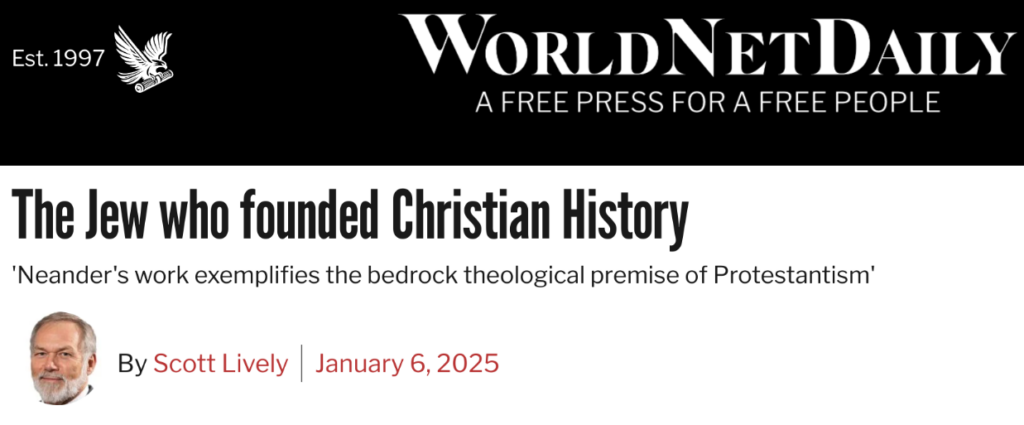
My title above is not a reference to our Jewish Messiah Jesus Christ, at least not directly, but to the “father” of modern Christian history, August Neander. He is so named by the renowned church historian Philip Schaff who modeled his own more comprehensive work on that of Neander. I have just begun reading Schaff’s eight-volume series, “History of the Christian Church,” published in 1907, and am very impressed by his writing style and perspective, which reads like Scripture itself, emanating Holy Spirit grace and beauty in the form of prose.
Consider this tribute to Neander in Schaff’s “Preface to the Revised Edition”:
“History should be written from the original sources of friend and foe, in the spirit of truth and love, ‘sine ira et studio,’ ‘with malice toward none and charity for all,’ in clear, fresh, vigorous style, under the guidance of the twin parables of the mustard-seed and leaven, as a book of life for instruction, correction, encouragement, and as the best exposition and vindication of Christianity. The great and good Neander, ‘the father of church history’ – first an Israelite without guile hoping for the Messiah, then a Platonist longing for the realization of his ideal of righteousness, last a Christian in head and heart, made such a history his life-work, but before reaching the Reformation he was interrupted by sickness, and said to his sister: ‘Hannchen, I am weary; let us go home; good night!’ And thus he fell gently asleep, like a child, to awake in the land where all problems of history are solved.”
What an eloquent yet poetic eulogy – which says as much or more about Schaff as it does about Neander.
Sine ira et studio is a phrase coined by the Roman historian Tacitus meaning “without anger or bias,” (describing his own method of approach), while “with malice toward none and charity for all” is, of course, the most famous phrase of Abraham Lincoln’s landmark Second Inaugural Address. Schaff, the Swiss-born, German-trained Reform theologian, who devoted most of his life to Christian service in America, had special cause to cite Lincoln: The Pennsylvania seminary where Schaff taught Christian history was forced to close down due to the ravages of the Civil War, and he personally shared the spirit of that Lincoln speech on the healing power of unity and reconciliation, having pursued that goal in Christendom itself – to the point of calling on the Roman Catholic pope to renounce the doctrine of “papal infallibility” as a necessary step toward closing the Catholic/Protestant rift.
This article, however, is about August Neander, the German Ashkenazi Jew turned Christian whom Schaff honored throughout his life. And MY purpose here is to showcase Neander as an example supporting my thesis in today’s intra-church divide over “Zionism.” My thesis is that the Jews – more accurately Hebrews (since “Jew” biblically and historically meant Southern Kingdom Judean as opposed to Northern Kingdom Israelite) – are God’s “chosen people” primarily in the sense that He intends select ones of them to serve as examples of the best and worst of humanity (the “figs” of Jeremiah 24) – as measured by His law. Neander was one of the best.
Born as David Mendel, son of a Jewish peddler named Emmanuel Mendel, he adopted the name Neander (new man) upon his baptism as a Protestant Christian in 1806. He was often described by his contemporaries as “wide-hearted, truthful, sincere, free from all the stuff of vanity, affectionate, innocent and pure of heart.”
A 2020 article in the academic publication The Historical Journal explains that Neander was not just another Christian historian, but essentially a savior of the discipline:
“August Neander (1789–1850), developed a religiously driven conception of history which excited contemporaries across the Protestant world. … At a time when Hegelian and ‘scientific’ models of historical progress foretold a post-Christian future for civilization, Neander’s alternative idea of world history, centered on the leavening spread of the invisible church through contrasting forms of Christianity and culture, exercised a powerful sway over Protestant historians everywhere. His universalizing historical philosophy offered an appealing mode of self-understanding to the networks which translated his ideas into new settings. Appearing to afford a mode of securing Protestantism from the twin dangers of sectarianism and unbelief, Neander’s ‘unpartisan’ philosophy simultaneously became an important instrument of Protestant nation-building in the hands of the historians drawn towards it.” [Emphasis added.]
Put another way, “His guiding principle in dealing both with history and with the contemporary condition of the church was ‘that Christianity has room for the various tendencies of human nature, and aims at permeating and glorifying them all; that according to the divine plan these various tendencies are to occur successively and simultaneously and to counterbalance each other, so that the freedom and variety of the development of the spiritual life ought not to be forced into a single dogmatic form” (Otto Pfleiderer).
Neander essentially appears to have established “non-denominationalism” as a respected theological camp in Christendom, giving life in practical terms to the spiritual principle of 1 Corinthians 12:12-26 in which unity of purpose in Christ harmonizes the diversity of the members of the Body of Christ. And because of this, Neander’s work exemplifies the bedrock theological premise of Protestantism – the priesthood of all believers – more than any other Christian historian I have encountered.
The Jew David “Neander” Mendel was perfectly suited to rescue 19th-century Christianity from denominational polarization and partisanship by entering Christendom from the inseparable parallel universe of Judaism from which it sprang – just as the apostles had done. Indeed, the profundity and consequence of his conversion was likened by Schaff to that of Saul of Tarsus, known to us as the Apostle Paul.
I’ll close by citing a bit of relevant Bible history on the role of Jews in Christendom, circling back to my mention of Jesus Christ in the first paragraph: Jesus, the Hebrew who was also, by force of law, a Jew (Judean) because His stepfather, Joseph, was one (of the line of David, no less). This fact made Jesus legally entitled to become King of the Jews, per the prophecy of Jacob in Genesis 49:10, even though His actual father was Jehovah God. Facts matter, but without historians to preserve them they have no power to guide us. The Jew Neander the Historian is thus, in my assessment, a hero of the church.



